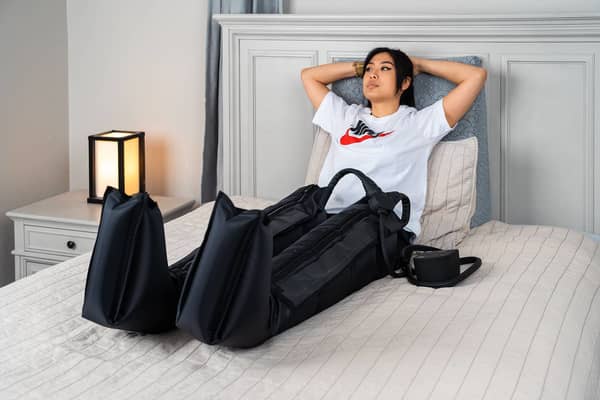What Are Polarised Sunglasses, And Do You Need Them? Experts Weigh In
Health & Wellness
Eye-care professionals explain how the shades work—and the benefits they can offer.

If you're in need of a new pair of shades, you'll be faced with making the decision between choosing polarised or non-polarised lenses. But, what does it mean when sunglasses are polarised?
Below, ophthalmologist Ashley Brissette, MD, MSc, FRCSC and Andrea Thau, OD, FAAO and former president of the American Optometric Association (AOA) answer questions about polarised sunglasses.

What Are Polarised Sunglasses?
Brissette explained that polarised sunglasses have lenses with a special coating that reduces glare, which helps improve visibility when you're outdoors in the sun.
"The polarisation helps to block certain directions of light from entering through the lens and eye", she said. "Take, for example, light bouncing off the water. When it hits the water, the light scatters into different directions, which can blur the image".
Polarisation, she added, filters out some of those rays of lights, which can "help make the image more clear and cut down on glare". However, because some of the light is filtered out, Brissette added that you'll notice things appear darker when wearing polarised sunglasses.
Conversely, if you've wondered what non-polarised sunglasses are, they're essentially just standard sunglasses that don't have the lens coating. Thau said this type of sunglasses may make it more challenging to see in certain viewing conditions, such as when it's really bright outside, compared to polarised sunglasses.
Another essential thing to note about sunglasses is that polarisation is not the same thing as ultraviolet, or UV, protection.
"UV radiation [from the sun] can cause cataracts, macular degeneration and skin cancers around the eyes", Thau said. Sunglasses with UV protection can help to block harmful UV rays that damage the eyes and eyelid skin, Brissette said.
So, polarised sunglasses don't automatically guarantee UV protection, Thau said. She said to look for sunglasses that clearly state that they have 100-percent UV protection, which are available in various price ranges.

When Should You Wear Polarised Sunglasses?
The short answer: it depends on what you're doing. When engaging in outdoor activities such as boating, fishing, golfing or spending time in the snow, polarised sunglasses can come in handy for creating a clearer and more comfortable viewing experience than non-polarised ones.
"These [activities] all have the potential for light rays to bounce off shiny objects and cause glare", Brissette said.
However, polarised sunnies don't just have to be saved for outdoor adventures—they can be useful for everyday tasks as well. Thau explained that polarised sunglasses are also great for driving a car during the daytime, as the glare from the sun reflects off other vehicles' boots or light-coloured pavements.
When the glare is reduced, she said you can see clearly and your eyes will feel a bit more comfortable than if you had the non-polarised version. In other words, they're great for people who deal with eye strain and irritation from bright sunlight.
Thau said that people with light-coloured eyes may experience more light sensitivity in bright environments such as sunlight, fluorescent light and incandescent light than those with darker-coloured eyes. That's because darker-coloured eyes contain more pigment that protects against harsh lighting.
Furthermore, it's possible that polarisation could benefit most drivers. In fact, the findings of one 2009 study suggested that polarised sunglasses helped cut down drivers' reaction time during peak daylight by up to 15 percent, compared to those who wore tinted sunglasses.

What Are the Best Polarised Sunglasses?
When shopping for polarised sunglasses, look for a label that indicates they are polarised, Thau said. To test them out, Brissette suggested putting them on and looking at a screen.
"Tilt your head left and right and [if] you notice a difference in the brightness of the screen, then they are polarised", she said.
Regardless of whether you opt for polarised or non-polarised sunglasses, per the AOA recommendations, the most important thing is that you wear sunglasses when outdoors all year, even on cloudy or overcast days because UV radiation can penetrate clouds. So while polarised sunglasses may not be needed on cloudy days, sunglasses with UV protection should be worn year-round for protection. Just bear in mind that darker lenses on polarised sunglasses don't allow as much light into the eye and Brissette said it may be tricky to see in low-light settings or on cloudy days.
And for optimal protection, both Thau and Brissette said they advise purchasing high-quality sunglasses that offer 100-percent UV blocking. Make sure you verify that the label says the sunglasses have UV protection because not all polarised sunglasses have it.
Lastly, if you're unsure what the right type of sunglasses are for different activities and your eyes specifically, consult an expert, Thau said. In this case, seeing an optometrist or ophthalmologist is highly recommended, as they can provide yearly comprehensive eye exams and make recommendations based on your needs.
Words by Jessica Estrada




